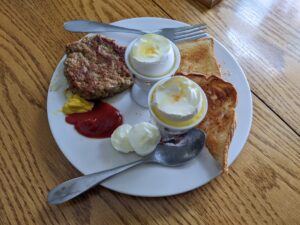Only on The Walters Post
These are my own thoughts from what I’ve seen and lived through. I’m sharing them to spark some thinking and honest conversation, not because I have all the answers.
You know, somewhere along the line, cholesterol got painted as the villain. Turn on the TV or open a magazine, and you would think it is the root of all evil, blamed for heart attacks, strokes, and everything in between. But the more I have looked into it, and the more I have listened to folks who are not just pushing pills or fear, the more I have come to believe there is no such thing as bad cholesterol or good cholesterol. There is just cholesterol, and we need it.
I learned this the hard way. Years ago, I was told things would only get better if I started taking one of those cholesterol-lowering drugs. At the time, I believed what they told me. “Precautionary measures, George, it’s in your best interest.” But was it?
Now in saying that, it did lower my cholesterol, that much was true, but not without a cost. After a short while, every bone in my body ached. I could not even lift my arms over my head. That pain was constant, so I started looking into it myself and sure enough, all those symptoms I was feeling were listed right there as side effects of the drug I was on. Once I saw that, I spoke with my doctor, and he said it was up to me if I wanted to stop. That was all I needed to hear. I took myself off the drug and, little by little, things started to get better.
What sticks with me most from that time is how, right from the beginning, something deep inside me told me it was wrong. My gut, my body, and my mind were trying to warn me. And still, I pushed those feelings aside and trusted what I was told. Looking back, I know now I should have listened to myself. Over the years, I’ve been lucky to learn from some pretty sharp and insightful people since then. These days, I listen to the instructions that come from within, and I don’t question them.
With cholesterol still on my mind, I asked myself what I could do to really support my health. That is when I learned that cholesterol is the raw material the body uses, with the help of sunshine on our skin, to make vitamin D. That made sense to me. So I decided to do what felt right. I started getting outside more, soaking up the sunshine, staying active, and feeding my body the best food I could find. I let Nature take the lead. And it worked.
I was not always sure how to explain this clearly to others. I had started to write something myself, but then a friend of mine, a smart doctor who does not follow the crowd, sent me an article he wrote. After reading it, I thought this says it better than I ever could. So I asked if I could include it in one of my books. He agreed without hesitation.
What Allan wrote made sense to me, and I think it might to you too. It is written in plain English, and it does not try to sell you anything. It just lays out the truth as he sees it, and I happen to agree with him.
So here it is, from Allan himself. Have a read, and next time someone tells you to fear your cholesterol, maybe give this another look and think it over for yourself.
“Bad” Cholesterol: The Unknown Heart Healer
by Allan Lawry
Originally published in HANS e-News,
If you think that “bad” or “high” cholesterol contributes to heart disease, you have been deceived by those marketing a mythical disease.
The so-called “bad” or LDL cholesterol is actually part of a natural healing process designed for repairing damaged arteries in your body. This damage is usually caused by inflammation and oxidation. Oxidation causes nicks and cuts on the inside walls of the arteries and leads to inflammation, much like a cut on the outside of your skin. This then sets into motion the body’s healing process. LDL cholesterol has many roles, and one of them is to help heal by forming a waxy “scab” over these cuts. That scab, often called plaque, protects the arterial wall and gives it time to heal from within, while still allowing blood to flow.
It is up to us to supply our bodies with the right ingredients for healing and to build healthy arteries that last a lifetime.
The myths about cholesterol need to be cleared up. Many studies show that people with high cholesterol live longer and suffer fewer heart problems than those with low cholesterol. Other research shows that eating fatty foods high in cholesterol has little or no effect on blood cholesterol levels.
As Dr. Ron Rosedale puts it, “There is only one cholesterol. There is no such thing as good or bad cholesterol.” LDL and HDL are not cholesterol, they are lipoproteins — transport vehicles for cholesterol, which the body needs.
Years ago, mainstream medicine noticed that people with heart disease had higher LDL levels. From that, they guessed that LDL must be the problem. But what they missed was that LDL shows up to patch the damage. It is the body’s attempt to heal, not harm.
It has since come to light that some of the researchers pushing to lower LDL were funded by the same companies making cholesterol-lowering drugs. In fact, over the past few decades, the so-called “safe” cholesterol levels have been lowered several times, not based on new science, but based on the financial interest of drugmakers.
Dr. Uffe Ravnskov, a respected cholesterol researcher, was once asked if lowering cholesterol through diet, drugs, or therapy made sense. He answered, “Absolutely not. This kind of treatment is meaningless, costly, and has transformed millions of healthy people into patients.”
Statins — the most common class of cholesterol-lowering drugs — have become a $29 billion global industry. They work by blocking an enzyme in the liver that makes cholesterol. But lowering cholesterol this way goes against what years of research now shows. It is not in your best interest to lower your cholesterol.
Cholesterol is essential for life. It helps transport fat-soluble vitamins like A, D, E, and K. It supports the brain, builds hormones, and plays a key role in the immune system and healing.
If you want to protect yourself from cardiovascular disease, the focus should be on lowering inflammation and oxidation. This means avoiding refined carbs, processed oils, and artificial sweeteners. Instead, eat natural foods, get regular exercise, spend time outdoors, and get plenty of sunshine for natural vitamin D. You can also ask your doctor to test for inflammation markers like C-reactive protein, homocysteine, insulin, and blood acidity.
Research shows the fats we should be avoiding are not from eggs or butter, but from processed and overheated oils — margarine, vegetable oils, trans fats, and anything fried. These oxidized fats create free radicals in the body, which lead to inflammation, oxidation, and eventually, damage to the arteries. That is the real cause of heart disease.
So the next time you hear an ad telling you to lower your cholesterol, take a step back and think about who is really benefiting. Your health is more important than their marketing.
I wish you all the best in your search for better health.
Until the next time: Keep Your Minds Open & Your Stories Alive. GW






